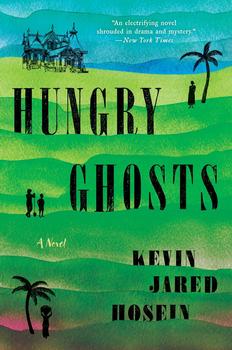Summary | Excerpt | Reviews | Beyond the Book | Readalikes | Genres & Themes | Author Bio

Critics' Opinion:
Readers' Opinion:
First Published:
Feb 2023, 336 pages
Paperback:
Feb 2024, 384 pages
 Book Reviewed by:
Book Reviewed by:
Jane McCormack
Buy This Book
A small stone stairway was cut into the hill. Only two steps down and Marlee could see how damaged the land had become. The river had indeed widened, the soil scarred with muddy rills. Her hand went straight to her mouth when she noticed the wooden stake. The attached leash, taut, led downward into the still-rumbling river. She took slow steps until she came to the edge, where she could see the dog attached to the other end.
A bloated ball of sinew and fur.
Brahma must have slipped down the embankment. The river was climbing to meet him, growling like some predatory animal.
Marlee turned around to see Vishnu and Shiva behind her. Their faces didn't show it, but she could hear their growls. Wasn't me who killed your brother, she wanted to tell them. She went to the steps and whistled for them to follow, but neither obeyed.
On her way back to the house, she pondered her own feelings about the dead dog. There was no sadness. Surely, this was not her doing. It was not her who forgot to untie the dog, and certainly, she was not to be expected to brave a late-night thunderstorm to make up for its owner's carelessness.
She returned to the house, where the crapaudback pumpkin patch and avocado trees came into view. She called his name. No response. At the empty homestead, she called again. Again, nothing. With that, she returned to the kitchen, made Ceylon tea. She would usually sit on the porch to drink but that morning, she took it to Dalton's shrine. Left the door open, sat cross-legged on the dusty floor and sipped, staring Xi Wang Mu right in the eyes. The goddess stared back. Both in silent judgement of each other.
When she was done, she went to the stairs of the porch, arms outstretched to the sun. Ahead was a fenced patch of land, once used as a paddock and recently converted into a small playing field. Dalton had prepared it for the children of Bell Village. Didn't make much sense to her – him opening his gates to a bunch of little strangers. During the last county fair, after much deliberation, he stepped onto the podium and announced it to the village. All under the guise of giving back – though Marlee was suspicious. From the end of the school year to the beginning of the next, all children were welcome. He wanted them to use the paddock for sport.
He set up a radio he'd bought from the Rediffusion company. Then toys, which he packed into a chest. Miniature dollhouses, plastic soldiers, slinky springs, dimestore comic books. He had his three main workers prepare the dusty course of a cricket pitch in the middle of the paddock, bought willow-wood cricket bats, smoothed with linseed oil, and a crate of cork balls. Now there was no longer the need to forage for a coconut branch and baby shaddocks to play the game.
The children arrived in droves. Wild shadows dancing under the afternoon sun. To them, the house stood as tall as the range, the front topped with three steep eaves, an ethereal sunburst atop the middle spire. The sides were of simple fenestration with the exception of two Demerara windows that always made it appear as if the house were peeking out with half-opened eyes. They were only allowed to enter the first room to the left of the foyer. They were, under no circumstances, to venture past the staircase. Upon entrance, greeting them was a triptych portrait. Paradise, earthliness and, finally, apocalypse. In the details were creatures and expressions cryptic and wonderful. It lay open like some mystical book, a butterfly in an abandoned church. Despite its ornate fretwork and fanlights and craftsmanship that teetered between Mughal and Art Deco, there was something intangible and sad about the Changoor house – as if it solely existed to recall greater times of heritage. Like a general of the vanguard, felled in battle, still adorned in his military emblems.
The room to the left was bright, immediately visible. Inside were goose-feather cushions strewn across a floral velveteen rug. A small, round table set up with a centrepiece of poinsettias flanked by two carnival glass bowls. One with cut guavas, the other with carambolas. The mahogany stand at the end of the room like a king before its loyal subjects. Its crown, the box radio prattling the words of Abbott and Costello.
Excerpted from Hungry Ghosts by Kevin Jared Hosein. Copyright © 2023 by Kevin Jared Hosein. Excerpted by permission of Ecco. All rights reserved. No part of this excerpt may be reproduced or reprinted without permission in writing from the publisher.





The Flower Sisters
by Michelle Collins Anderson
From the new Fannie Flagg of the Ozarks, a richly-woven story of family, forgiveness, and reinvention.

The House on Biscayne Bay
by Chanel Cleeton
As death stalks a gothic mansion in Miami, the lives of two women intertwine as the past and present collide.

The Funeral Cryer by Wenyan Lu
Debut novelist Wenyan Lu brings us this witty yet profound story about one woman's midlife reawakening in contemporary rural China.
Your guide toexceptional books
BookBrowse seeks out and recommends the best in contemporary fiction and nonfiction—books that not only engage and entertain but also deepen our understanding of ourselves and the world around us.